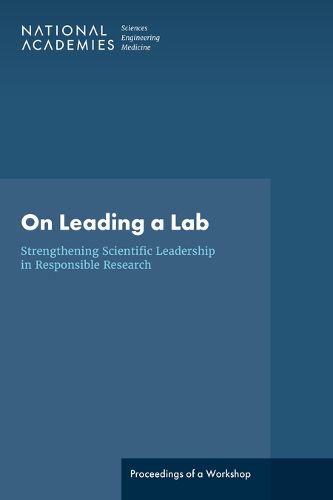Readings Newsletter
Become a Readings Member to make your shopping experience even easier.
Sign in or sign up for free!
You’re not far away from qualifying for FREE standard shipping within Australia
You’ve qualified for FREE standard shipping within Australia
The cart is loading…






Research leaders overseeing laboratories, centers, and collaborations have an opportunity to build and promote a culture of research excellence, integrity, and trust. At the same time, the conduct of science becomes more complex, societal demands become more explicit, and the challenges facing these leaders are myriad. Beyond the complexities of overseeing and executing innovative science, they must navigate an expanding set of roles, responsibilities, and expectations, including managing the evolving landscape of research integrity, data management, open science, mentorship, and technology.
To explore the range of roles and evolving responsibilities taken on by research leaders, especially those who lead cross-disciplinary and/or multi-institutional teams, the National Academies' Strategic Council for Research Excellence, Integrity, and Trust convened a workshop on December 4-5, 2023. Presentations and discussion of the workshop focused on scientific leadership to examine available responsible conduct of research (RCR) resources and the broad span of roles for research leaders, especially those who direct laboratories, centers, departments, or collaborations. Participants also explored the evolving needs of research leaders in a changing societal landscape, especially in terms of their roles in upholding RCR, navigating new oversight frameworks, and training the next generation of scientists. This publication summarizes the presentations and discussion of the workshop.
Table of Contents
Front Matter 1 Introduction 2 Scientific Leadership for Ethical and Responsible Research 3 Gaps in Traditional Approaches to Professional Development 4 Federal Research Funding and Resources for Leaders of Large Centers and Projects 5 Knowledge Base for Developing Effective Innovations 6 Innovative Approaches Being Developed or Implemented 7 Taking Stock: Takeaways from Day 1 and Launching Day 2 8 Key Needs to Address Going Forward Appendix A: Workshop Agenda Appendix B: Biographical Sketches Appendix C: Resources
$9.00 standard shipping within Australia
FREE standard shipping within Australia for orders over $100.00
Express & International shipping calculated at checkout
Research leaders overseeing laboratories, centers, and collaborations have an opportunity to build and promote a culture of research excellence, integrity, and trust. At the same time, the conduct of science becomes more complex, societal demands become more explicit, and the challenges facing these leaders are myriad. Beyond the complexities of overseeing and executing innovative science, they must navigate an expanding set of roles, responsibilities, and expectations, including managing the evolving landscape of research integrity, data management, open science, mentorship, and technology.
To explore the range of roles and evolving responsibilities taken on by research leaders, especially those who lead cross-disciplinary and/or multi-institutional teams, the National Academies' Strategic Council for Research Excellence, Integrity, and Trust convened a workshop on December 4-5, 2023. Presentations and discussion of the workshop focused on scientific leadership to examine available responsible conduct of research (RCR) resources and the broad span of roles for research leaders, especially those who direct laboratories, centers, departments, or collaborations. Participants also explored the evolving needs of research leaders in a changing societal landscape, especially in terms of their roles in upholding RCR, navigating new oversight frameworks, and training the next generation of scientists. This publication summarizes the presentations and discussion of the workshop.
Table of Contents
Front Matter 1 Introduction 2 Scientific Leadership for Ethical and Responsible Research 3 Gaps in Traditional Approaches to Professional Development 4 Federal Research Funding and Resources for Leaders of Large Centers and Projects 5 Knowledge Base for Developing Effective Innovations 6 Innovative Approaches Being Developed or Implemented 7 Taking Stock: Takeaways from Day 1 and Launching Day 2 8 Key Needs to Address Going Forward Appendix A: Workshop Agenda Appendix B: Biographical Sketches Appendix C: Resources